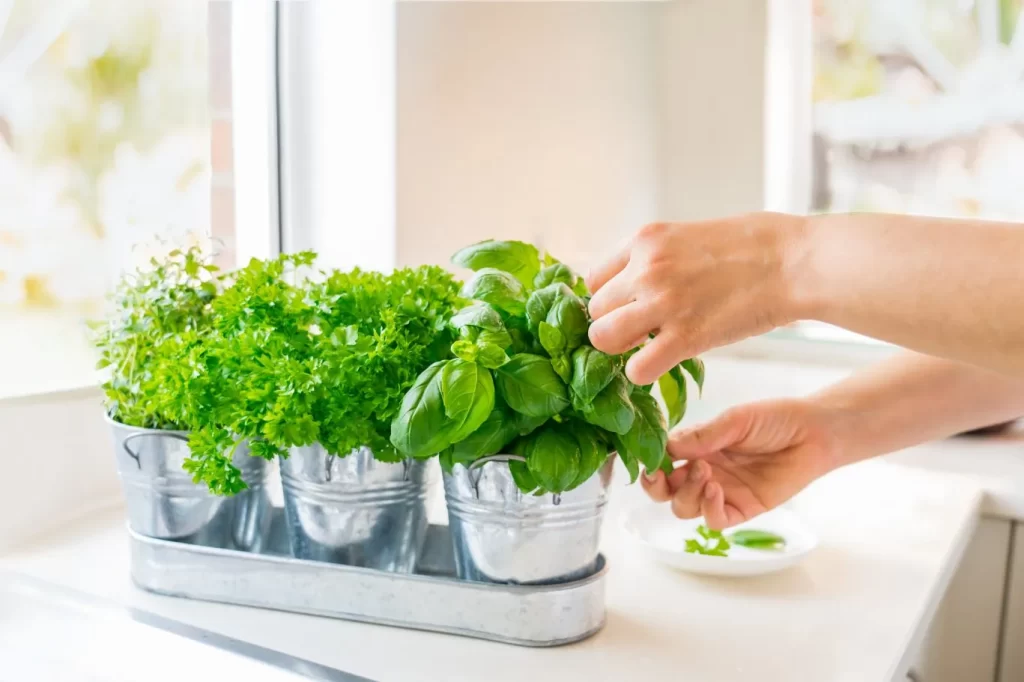Herbs require ample lighting, with the best place for their cultivation being a sunny location like a south-facing window or using additional lighting sources such as grow lights.
Find beautiful herb containers and planters that can hook onto the wall to save space on windowsills. Avoid porous clay pots which leave water stains behind – instead opt for plastic or glazed versions instead for optimal performance.
Choose Your Herbs Wisely
Most herbs thrive when exposed to full sunlight; for optimal results, opt for windows facing south; windows with eastern or western exposure will receive less light in the morning and afternoon hours.
Herbs require minimal upkeep; however, a small dose of dilute fertilizer can increase their health and vitality.
Water requirements differ considerably among herbs. While some prefer being allowed to dry out between watering sessions – such as oregano and thyme – others, such as basil and mint, need constant moisture for optimal growth. Plants exposed to too much dryness could develop root rot.
Select Your Containers Wisely
When growing herbs for culinary use, selecting an appropriate container is of utmost importance. For optimal growth of herbs, choose containers which allow their roots to breathe while providing drainage holes at the base of each.
Light is of vital importance when cultivating your herb garden. A south-facing window will provide most herbs with sufficient sunlight; west, east or north-facing windows may work for others (particularly parsley and mint). If it’s impossible for your herbs to get enough direct sun light then consider investing in a grow light to assist them.
Avoid artificial heat sources like space heaters and radiators which produce dry air that robs plants of moisture from their leaves, including artificial heating elements like space heaters and radiators.
Keep Your Herbs Moisturized Wisely
Herbs require moist soil without becoming soggy; stick your finger into the ground to check its moisture level prior to watering.
Herbs that require full sun, such as rosemary, thyme, oregano and basil thrive when exposed to unblocked south windows but can also thrive with skylights or west-facing windows if there is sufficient exposure. A homemade grow light may supplement natural lighting if needed.
Make sure your pots, planters, or containers have drainage holes for proper herb drainage. Without adequate drainage, herbs could suffer from root rot. Add some slow-release fertilizer when watering your herbs for maximum effectiveness.
Give Your Herbs Plenty of Light Wisely
Many herbs need six to eight hours of direct sunlight each day in order to flourish and produce quality results. Without adequate light, herbs may wilt or yellow in appearance resulting in poor growth or becoming yellow and wilted over time.
Herbs thrive when exposed to sufficient light from any direction – south-facing windows provide ideal conditions, although west, east or north windows may provide sufficient illumination as well.
If your windowsill doesn’t get much sun, consider investing in a DIY grow light instead. These lights mimic direct sunlight to help your herbs flourish.
Trim Your Herbs Wisely
Herbs grown indoors may quickly become tall and leggy, so to keep them healthy and productive, pinch off the top portion near a leaf node to encourage branches to form. This will prevent overwatering.
Many herbs thrive when placed in a south-facing window that receives at least six hours of direct sunlight per day, while some can tolerate even less direct light.
Addition of a grow light is one way to provide sufficient illumination in your herb garden, such as this model from Oslo Grow Lights. Be sure to choose an attractive yet functional model like this one!
Maintaining healthy herb plants requires monitoring them for pests. Keep an eye out for sticky residue, webs or black specks on leaves as a sign that pests have invaded.
Harvest Your Herbs Wisely
Indoor herb gardens can be relatively simple to grow and maintain when utilized correctly. Most herbs require warm temperatures, adequate lighting, and sufficient moisture for growth; some also need regular watering or plant food feedings in order to thrive.
Most herbs require 6-8 hours of sunlight daily in order to thrive, with south-facing windows being ideal. But other windows such as east or west facing ones as well as skylights can work just as effectively.
Grow lights provide artificial sunlight, making them essential in winter when plants require less sun exposure. You can even find ornamental pieces designed specifically to complement an indoor herb garden.


